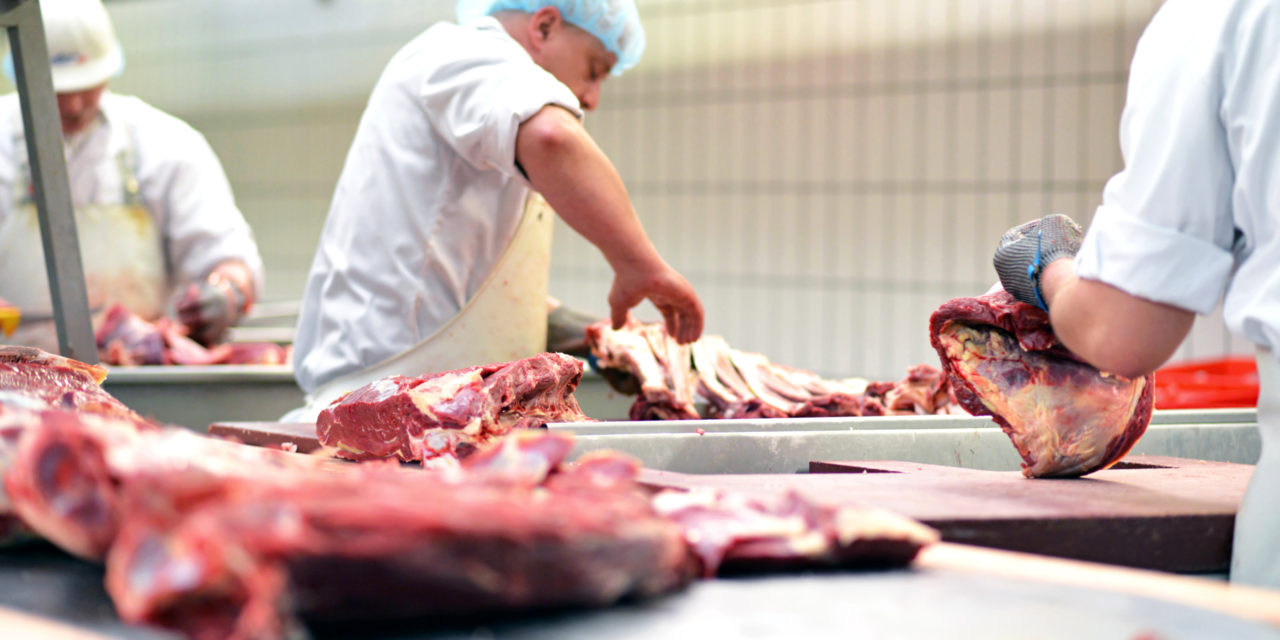The coronavirus presents a clear and immediate danger to America’s food supply. Meatpacking plants in particular have taken a huge hit. To mitigate the loss of production, President Trump signed an executive order on April 28 to ensure that meatpacking plants “continue operations uninterrupted to the maximum extent possible.”
The order may help put food on Americans’ tables. But it does little for the health of immigrant and U.S.-born workers who are at risk every single day they step into a plant.
Over 50% of meatpackers are immigrants, including many refugees. 6,500 meatpackers in total have been infected with coronavirus. 20 have died.
Immigrant Meatpackers Suffer from Inadequate Health Care and Worker Protections
Meatpacking plants have become hotspots for COVID-19, requiring many of them to shut down. The environment in these plants makes following social distancing guidelines impossible. Workers stand cramped in the slaughterhouse’s sweltering heat and experience frigid temperatures in the plant’s freezer. This poses a danger to all workers.
Immigrant meatpackers appear uniquely vulnerable in this situation.
Slaughterhouse conditions are exacerbated by a lack of worker protections and benefits. For instance, many immigrant meatpackers have limited access to health care. If they fall ill, they cannot rely on the safety net of the U.S. health care system.
Some may also feel pressured to continue working through an illness. Immigrants—documented and undocumented alike—have been left out of the federal government’s coronavirus relief efforts. The food processing industry also doesn’t offer paid sick leave as a standard for any workers.
This combination could prove deadly. Forcing meatpackers to return to risky work conditions without the needed health care or a safety net if they get sick could hurt them and their communities at a time when we should be prioritizing public health.
Trump’s Food Supply Executive Order Prioritizes Corporations, Not Workers
The president invoked the Defense Production Act when he signed this latest executive order. The act allows him to designate meatpacking plants as “critical infrastructure” to “ensure that Americans have a reliable supply of products like beef, pork, and poultry.”
With this designation, food processing plants are required to stay open during the coronavirus pandemic.
But the order fails to protect the very people needed to keep this industry moving forward.
Meatpackers—as well as many other essential workers—still haven’t received hazard pay. And the executive order was reportedly drafted with guidance provided by grocery store executives, not labor unions or the workers themselves.
The Trump Administration Didn’t Act Quick Enough to Save Meatpacking Workers
Unions leaders argue that the administration didn’t act swiftly enough to save workers’ lives or safeguard the U.S. food supply chain.
Some of the largest food processing plants around the country have shuttered in the last month. Tyson Foods, the largest supplier of meat in the United States, shut down two of its pork-processing plants this week. These closures came as hundreds of workers contracted COVID-19.
President of the Retail, Wholesale, and Department Store Union Stuart Appelbaum said the closures happened for a reason:
“When poultry plants shut down, it’s for deep cleaning and to save workers’ lives. If the administration had developed meaningful safety requirements early on as they should have and still must do, this would not even have become an issue.”
Earlier requests to the Trump administration made by union leaders for aid and personal protective equipment went unanswered. In some cases, individual companies have had to fill in the gaps left by the federal government.
Protecting Immigrant and Refugee Workers Is Vital to Revitalizing the U.S. Economy
The Trump administration deemed meatpackers “essential workers.” Its failure to respond to their needs suggests they are disposable.
But they have, in fact, been essential to the growth of rural America and the food processing industry for years.
Many of these plants—from Tyson to Smithfield Foods—are in rural parts of the country that suffered economic losses during the 2008 recession. Shifts in other blue-collar industries also hurt these communities. And aggressive immigration enforcement led to the arrest of many immigrant workers who had previously held meatpacking jobs.
Other foreign-born workers—and refugees in particular—filled in those gaps. Asian, African, Mexican, and Central American refugees now make up a large percentage of the meatpacking industry.
Communities that have accepted refugees have seen the benefits tenfold. Communities once in economic tailspins have thrived thanks to the work of refugees and immigrants.
When America rebuilds after the coronavirus, these workers will be essential to revitalizing the U.S. economy.
The Trump administration must step up to protect these essential workers now. Americans’ food supply, our communities, and people’s lives depend on it.
FILED UNDER: covid-19, refugees


